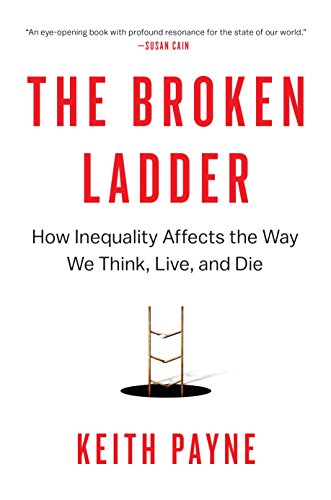Bargain Bin Books
The Broken Ladder: How Inequality Affects the Way We Think, Live, and Die
Couldn't load pickup availability
Author: Payne, Keith
Number Of Pages: 256
Details:
"A persuasive and highly readable account." —President Barack Obama“Brilliant. . . . an important, fascinating read arguing that inequality creates a public health crisis in America.” —Nicholas Kristof, New York Times“The Broken Ladder is an important, timely, and beautifully written account of how inequality affects us all.” —Adam Alter, New York Times bestselling author of Irresistible and Drunk Tank PinkA timely examination by a leading scientist of the physical, psychological, and moral effects of inequality. The levels of inequality in the world today are on a scale that have not been seen in our lifetimes, yet the disparity between rich and poor has ramifications that extend far beyond mere financial means. In The Broken Ladder psychologist Keith Payne examines how inequality divides us not just economically; it also has profound consequences for how we think, how we respond to stress, how our immune systems function, and even how we view moral concepts such as justice and fairness. Research in psychology, neuroscience, and behavioral economics has not only revealed important new insights into how inequality changes people in predictable ways but also provided a corrective to the flawed view of poverty as being the result of individual character failings. Among modern developed societies, inequality is not primarily a matter of the actual amount of money people have. It is, rather, people's sense of where they stand in relation to others. Feeling poor matters—not just being poor. Regardless of their average incomes, countries or states with greater levels of income inequality have much higher rates of all the social maladies we associate with poverty, including lower than average life expectancies, serious health problems, mental illness, and crime. The Broken Ladder explores such issues as why women in poor societies often have more children, and why they have them at a younger age; why there is little trust among the working class in the prudence of investing for the future; why people's perception of their social status affects their political beliefs and leads to greater political divisions; how poverty raises stress levels as effectively as actual physical threats; how inequality in the workplace affects performance; and why unequal societies tend to become more religious. Understanding how inequality shapes our world can help us better understand what drives ideological divides, why high inequality makes the middle class feel left behind, and how to disconnect from the endless treadmill of social comparison.
Reviews:
"A persuasive and highly readable account of how rising inequality, and not just absolute poverty, is undermining our politics, social cohesion, long term prosperity, and general well-being."
— President Barack Obama
“Brilliant. . . . an important, fascinating read arguing that inequality creates a public health crisis in America. . . . Payne challenges a common perception that the real problem isn’t inequality but poverty, and he’s persuasive that societies are shaped not just by disadvantage at the bottom but also by inequality across the spectrum. . . . So much of the national conversation now is focused on President Trump, for understandable reasons. But I suspect that he is a symptom as well as a cause, and that to uncover the root of our national dysfunctions we must go deeper than politics, deeper than poverty, deeper than demagoguery, and confront the inequality that is America today.” —Nicholas Kristof, New York Times
“Authoritative, thought provoking, accessible and well worth a spot on your summer reading list. . . . Payne embraces the egalitarian view that inequality of income is problem in and of itself—economically, morally, politically. . . . Demonstrate[s] how much more interesting and enlightening the inequality debate has become since those early days when it was mostly labor economists debating how much inequality had increased and whether ...
EAN: 9780525429814
Release Date: 02-05-2017
Languages: English
Item Note: Great shape- pages are unmarked and sharp.Has a remainder mark. Hardcover Used - Like New Ships fast! 2017
Item Condition: UsedLikeNew
Binding: Hardcover
Share


